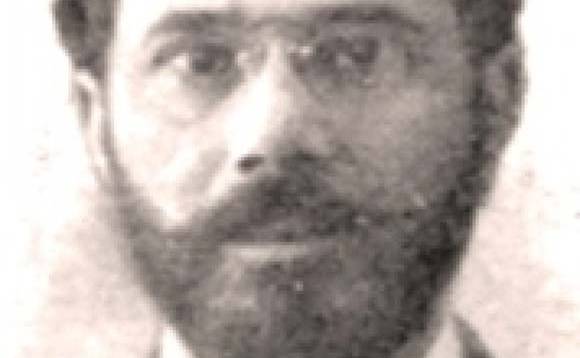Agis Theros–Poet, Folklorist, Sociologist

Agis Theros (whose real name was Spyros Theodoropoulos) was born in 1875 in Sparta, Laconia. He studied at the Law School of the University of Athens and then devoted himself to Sociology and Labour Law for years, helping to found the first Labour Unions.
In 1901, at the age of 26, he appeared in literature for the first time with a translation of the one-act drama "Two Pains" by François Coppe, dedicated to the Christomanos' "New Stage". Folk songs were his great passion, from which his personal style has been dramatically influenced. In 1909, he published his first book, which contained a collection of folk songs from the regions of Taygetos and Mani. He was a close associate of the "father" of folklore, Nikolaos Politis, and one of the founding members of the "Hellenic Folklore Society" (December 1908).
Agis Theros engaged in journalism and published the "Laos" (1908-1909 and 1914-1915), "Lakedaimon" (1909-1910) and "Efimeris ton Ergaton" (1912) newspapers. He was also the editor-in-chief of the daily newspaper "Sotiria" and wrote prose and poems for various magazines then. From 1901 to 1910, he published the annual "Spartiatiko Imerologion", which contained everything related to the history, folklore, antiquities and poetry of Laconia - a source of information that remains particularly important to this day.
In addition to his literary work, Agis Theros noted a remarkable activity in the scientific, political and social fields. He contributed to establishing the Labour Centre of Athens (1910) and was elected three times as a Member of Parliament (1910, 1912, 1923). In 1922, because of the "Democratic Manifesto" that he signed along with other democratic statesmen, he was arrested and imprisoned.
Agis Theros was president of the "Society of Greek Writers" (1957-1959) and represented Greece at literary conferences abroad. In 1940 (at an advanced age), he published his first collection entitled "The Humans", for which the Ministry of Education awarded him. This was followed by a series of prose and poetry books which either praise the resistance of the Greeks during the Second World War or present lyrical moments of rural ethnography, such as "The Magician" (1946) "With the Winds" (1948) "The Key to the Weather" (1954) "From the Deep" (1961) etc.
The fruit of Agi Thero's long folklore work is "The Songs of the Greeks," a two-volume work published in 1951-1952. The Academy of Athens awarded this important work as a top performance of his folklore and his literary activity.
Agis Theros died in 1961 (at the age of 86) in Athens, while two years later, his wife, Avra Theodoropoulou, also died. In conclusion, let us mention that the annual Folklore Award of the "Society of Greek Writers" carries the name Agis Theros.



